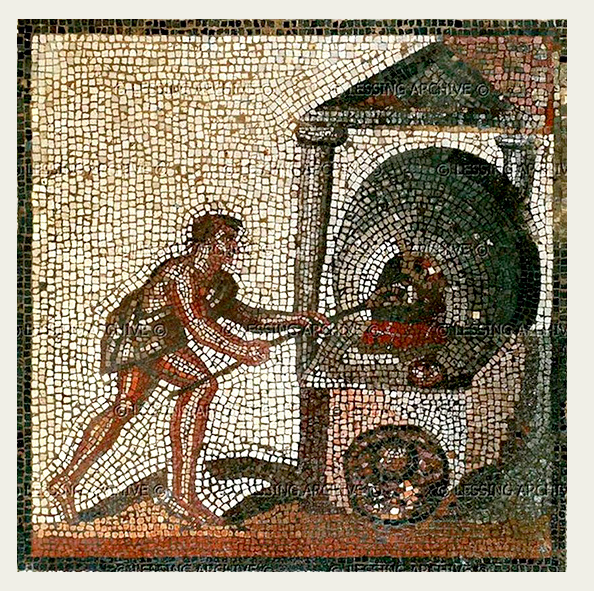
Fornacalia was a corn festival that took place around February 7th to the 17th. It celebrated the Goddess Fornax who was the Goddess of the Oven – specifically the grain oven for drying grain. The word for oven is also Fornax, from which we derive furnace (probably). So the celebration was to ensure that Rome’s all important grain supply was kept intact. Rome had a population of one million people, free bread was given to the people, and the Roman government took on the responsibility of providing the grain in a system called the Annona. The Annona brought grain from Egypt. Dominic Perring in his recent book on Roman London (Londinium in the Roman Empire) speculates that the fluctuating fortunes of London was depended upon the routing of a northern annona through Londinium.
The Festivals in Rome were organised by the Curio Maximus who was a priest who supervised the curiae. In Rome the citizens were arranged, originally, into the 3 ancient tribes of Rome (founded in the 8th Century BC). The Tribes changed through time until there were 4 urban tribes (Collina, Esquilina, Palatina, Suburana ) and 31 Rural tribes (see this Wikipedia page). The tribes were then divided into 10 curiae each. So there were 30 curiae.
Each Roman was supposed to be assigned to one of the curiae, which had a religious, social and voting function. The members of the curiae were known as curiales. Each curiae had their own priest, or curio, and assistant ‘flamen curialis‘. And they organised the religious ceremonies of the curiae. They met in a meeting place called the curia.
So the Curio Maximus would declare when a festival was to be held, and get the curiae to organise the celebrations at the curia. I hope you are still with me! They would choose a date, for example for the Fornacalia, between about the 7th Feb and the 17th of February. And the citizens would go to their curia where there would be a ceremonial roasting of the grain, and baking into bread which would be in honour of the Goddess Fornax.
Pliny the Elder says it was King Numa Pompilius (753-673 BC), who established Fornacalia, The Feast of Ovens.
Ovid, who wrote his almanac poem on the Roman festivals (Fasti), reveals many of these details and points out that many people didn’t know which curiae they were in, and so they would celebrate on the last day of the Festival, which therefore became known as the Feast of Fools.
Learn too why this day is called the Feast of Fools.
The reason for it is trivial but fitting.
The earth of old was farmed by ignorant men:
Fierce wars weakened their powerful bodies.
There was more glory in the sword than the plough:
And the neglected farm brought its owner little return.
Yet the ancients sowed corn, corn they reaped,
Offering the first fruits of the corn harvest to Ceres.
Taught by practice they parched it in the flames,
And incurred many losses through their own mistakes.
Sometimes they’d sweep up burnt ash and not corn,
Sometimes the flames took their huts themselves:
The oven was made a goddess, Fornax: the farmers
Pleased with her, prayed she’d regulate the grain’s heat.
Now the Curio Maximus, in a set form of words, declares
The shifting date of the Fornacalia, the Feast of Ovens:
And round the Forum hang many tablets,
On which every ward displays its particular sign.
Foolish people don’t know which is their ward,
So they hold the feast on the last possible day.
Book II: February 17 From: Fasti, Book 2. Translated by A.S Kline and available here
For more information: www.vindolanda.com/blog/celebrating-the-fornacalia wikipedia.org/wiki/Fornacalia
Fornication
I was told that the Roman word for someone who looked after a furnace was the fornicator. And as heat was a ’cause’ of lust, fornicators well, they fornicated.
However, others derive the word from the word Fornix, which is an arch, and which, it is said, was where the Brothels were, hence fornicator. Not sure I’m going with that idea that Brothels were always under arches. But here is the online etymology dictionary’s definition which might help you make up your mind:
from Late Latin fornicationem (nominative fornicatio), noun of action from past-participle stem of fornicari “to fornicate,” from Latin fornix (genitive fornicis) “brothel” (Juvenal, Horace), originally “arch, vaulted chamber, a vaulted opening, a covered way,” probably an extension, based on appearance, from a source akin to fornus “brick oven of arched or domed shape” (from PIE root *gwher- “to heat, warm”). Strictly, “voluntary sex between an unmarried man and an unmarried woman;” extended in the Bible to adultery. The sense extension in Latin is perhaps because Roman prostitutes commonly solicited from under the arches of certain buildings.
As you can see it’s a big mix-up of arches, brothels, brick ovens, all quite unconvincing, so I’m sticking with my over-heated stoker theory.
First published February 2023 and revised and republished 17th February 2024
